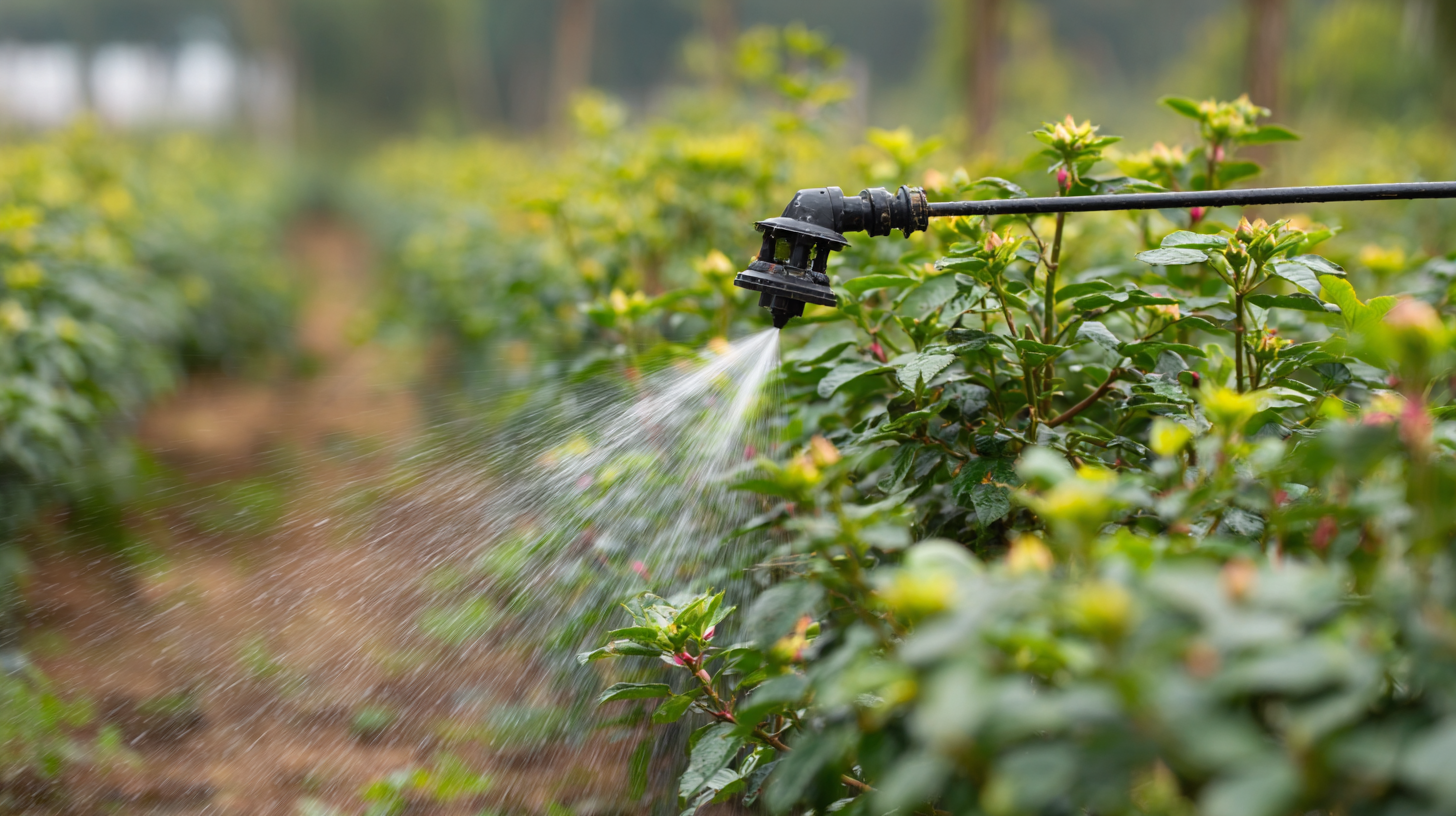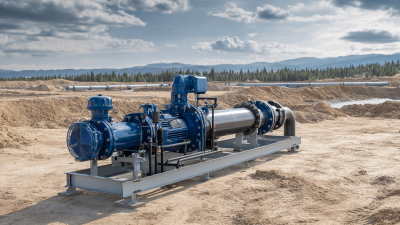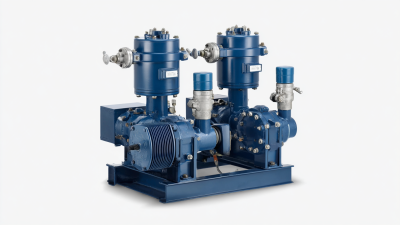How to Choose the Right Electric Sprayer Pump for Your Needs
Choosing the right electric sprayer pump is crucial for maximizing efficiency and effectiveness in various applications, from agricultural spraying to pest control. According to the latest market research report by Grand View Research, the global electric sprayer market is projected to reach $5.2 billion by 2026, with a compound annual growth rate (CAGR) of 7.8%. This growth is driven by the increasing demand for precision farming and the need for environmentally friendly pest management solutions. Users must consider factors such as flow rate, pressure, and compatibility with different types of liquids when selecting an electric sprayer pump. By understanding your specific needs and requirements, you can make an informed decision that aligns with industry standards and enhances your operational efficiency.

Understanding Your Spraying Needs: Assessing Job Requirements
When choosing the right electric sprayer pump, understanding your spraying needs is crucial for selecting a model that meets your job requirements. First, assess the specific tasks you'll be performing, such as agricultural spraying, pest control, or gardening. Different applications may require varying flow rates, pressure levels, and chemical compatibility. For instance, larger agricultural operations might need a high-capacity pump with a substantial output, while smaller gardening tasks can be efficiently handled with a compact model.
Additionally, consider the size of the area you intend to spray. A larger area would benefit from a pump that offers extended coverage and durability, minimizing the need for frequent refills. Examine the types of chemicals or solutions you plan to use as well; not all pumps are designed to handle harsh or corrosive substances. By evaluating these factors carefully, you can ensure that your selected electric sprayer pump aligns perfectly with your specific project requirements, enhancing efficiency and effectiveness in your spraying tasks.
Choosing the Right Electric Sprayer Pump: Job Requirements Analysis
Types of Electric Sprayer Pumps: Key Features and Benefits
When selecting an electric sprayer pump, understanding the various types and their key features is essential to making an informed choice. Electric sprayer pumps generally fall into categories such as diaphragm pumps, piston pumps, and roller pumps, each serving unique applications. For instance, diaphragm pumps are renowned for their versatility and ability to handle various liquids, making them ideal for agricultural use where chemical application precision is critical. According to a report by MarketsandMarkets, the global agricultural spray equipment market is projected to grow at a CAGR of 5.3% from 2020 to 2025, highlighting the increasing demand for effective spraying tools.
Each type of pump also offers distinct benefits. Piston pumps are known for their high pressure and efficiency, providing exceptional spray patterns, which is particularly advantageous for larger fields or industrial applications. On the other hand, roller pumps are lauded for their ease of maintenance and ability to handle abrasive materials without wearing out quickly. As the industry evolves, advancements in technology continue to enhance the performance and reliability of these sprayer pumps, influencing user preferences significantly. Choosing the right pump depends on specific needs, such as the type of liquid, application method, and required pressure, ensuring optimal results in any setting.

Evaluating Pump Performance: Flow Rate and Pressure Considerations
When selecting an electric sprayer pump, understanding flow rate and pressure is crucial for achieving optimal performance. Flow rate, measured in gallons per minute (GPM), indicates how much liquid the pump can deliver. A higher flow rate means more efficiency in covering larger areas, but it’s essential to balance this with the pressure generated by the pump. Too much flow without adequate pressure can lead to uneven application, while too little flow may bog down tasks requiring ample coverage.
**Tips:** Before making a purchase, consider your specific needs. If you're working on a large farm or extensive landscaping, a pump with a higher GPM and pressure would be beneficial. For smaller gardening tasks, a lower flow rate may suffice, allowing for better control and precision.
Pressure, typically measured in pounds per square inch (PSI), affects the reach and intensity of your spray. A pump designed for higher PSI is essential for effectively targeting tall plants or hard-to-reach areas. Always check the specifications to ensure the pump can handle your intended tasks without underperforming.
**Tips:** When evaluating pumps, don’t just focus on numbers; understanding the application type is vital. For instance, if you're applying pesticides, you may need a pump that can maintain consistent pressure over varied terrain. It's all about selecting the pump that meets both your flow rate and pressure requirements for the job at hand.
Portability and Storage: Choosing the Right Size and Weight
When selecting an electric sprayer pump, portability and storage are crucial factors to consider. The size and weight of the pump directly influence how easily you can transport it from one site to another. Lightweight models are often preferred for smaller tasks or when moving between different locations, especially if you have limited physical strength or need to navigate tight spaces. Investing in a compact design can also save you time and energy during setup and teardown, enhancing your overall efficiency.

Moreover, consider the storage options available for the pump. Some electric sprayer pumps come with built-in features that facilitate easy storage, while others may require additional space. Assessing your available storage area at home or on the job site can help determine the right dimensions for your pump. A unit that can be disassembled or has collapsible components may be beneficial if space is at a premium. Ultimately, balancing the size and weight with your specific mobility needs will guide your choice of an electric sprayer pump that best suits your requirements.
Budgeting for Your Electric Sprayer Pump: Cost vs. Value Analysis
When considering the purchase of an electric sprayer pump, it's crucial to conduct a thorough cost versus value analysis. This analysis begins with understanding not just the initial purchase price but also the long-term value it provides. According to recent market studies, the growth of the electric pump segment, particularly in applications such as sewage management, indicates a significant rise in demand. The global sewage pump market is projected to exceed USD 220 million, reflecting a broader trend in investing in durable and efficient pumping solutions.
Budgeting for an electric sprayer pump involves evaluating its performance capabilities and operational efficiencies against its cost. High-quality pumps may require a larger initial investment but often result in lower operational costs over time due to their efficiency and reliability. Furthermore, the latest insights suggest that advancements in technology provide additional value through improved features such as enhanced pressure control and energy-saving designs. Therefore, a comprehensive understanding of the market dynamics and the specific needs of your application is essential in making an informed decision that balances both cost and long-term value.
Related Posts
-

Challenges Encountered with Submersible Pumps in Industrial Applications
-

Troubleshooting Issues with Dual Diaphragm Pumps for Optimal Performance
-

How to Choose the Right Water Tank Pump for Your Needs
-

Optimizing Efficiency: Essential Strategies for Chemical Transfer Pump Performance in Industry
-

Comprehensive Guide to Choosing the Right High Pressure Diaphragm Pump for Your Needs
-

Ultimate Guide to Choosing the Best 12 Volt Sprayer Pump for Your Agricultural Needs